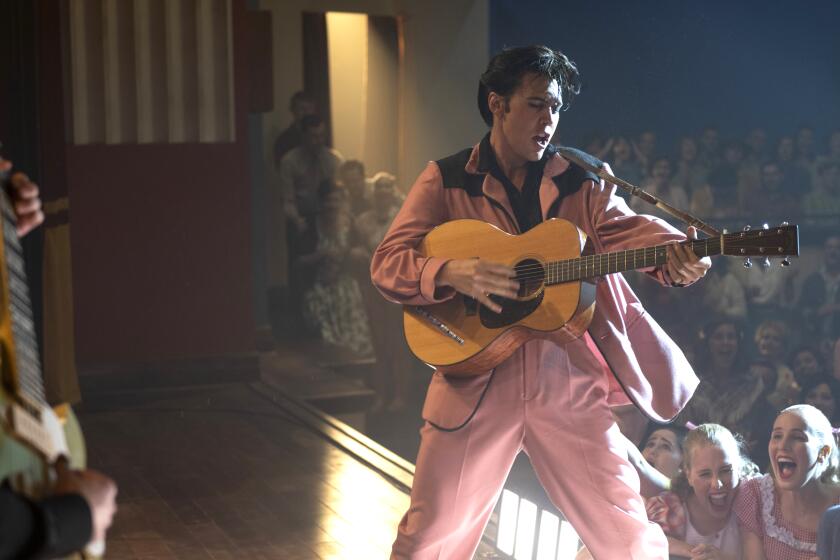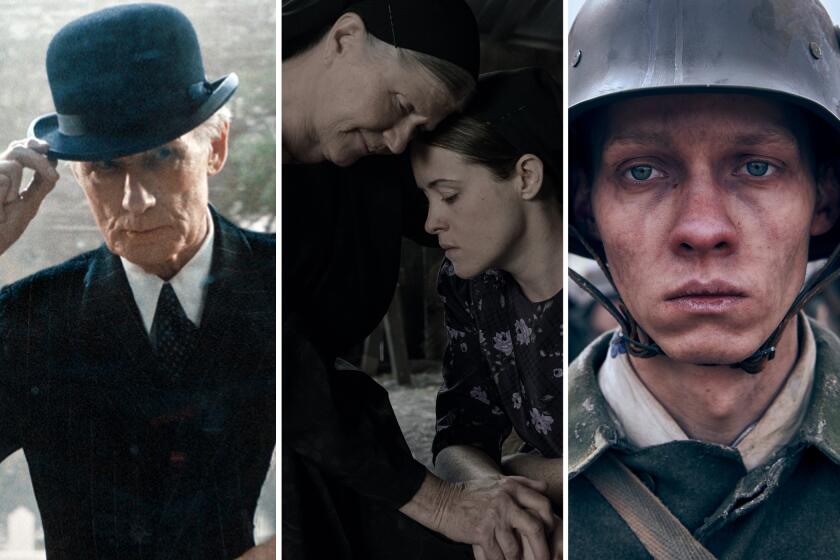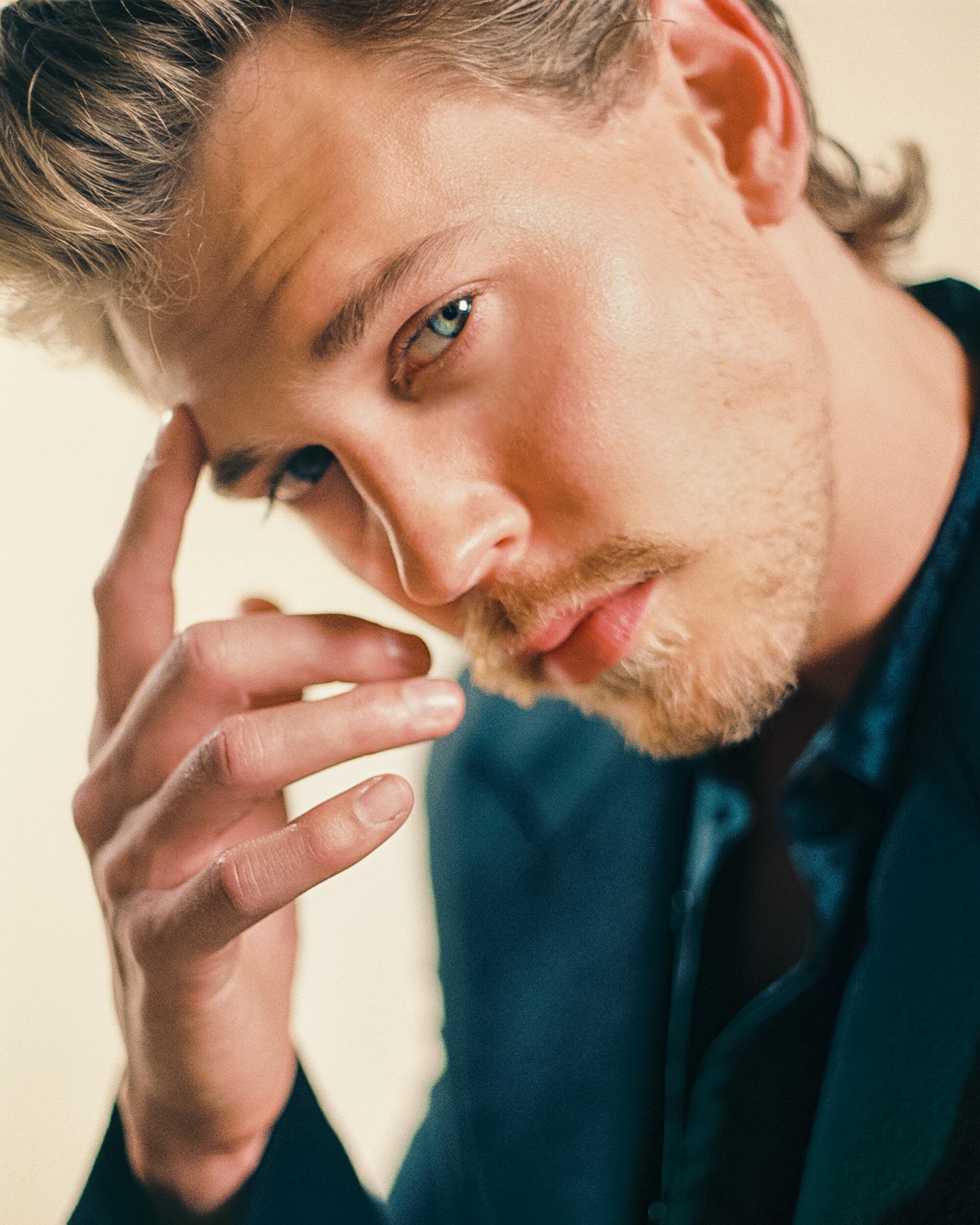
Austin Butler has, as you might guess, a ton of Elvis playlists in his Spotify account. He created the first one three years ago while he was painting a Los Feliz house he had just moved into, right at the beginning of the five months he spent trying to convince Baz Luhrmann to cast him as the lead in “Elvis.”
Butler won the part, and for the next two years he never stopped listening to Elvis. He made playlists to inspire emotions for scenes in the movie. (Loneliness was big in these sets.) He made a playlist of gospel and blues music that Presley loved and listened to. And, for a challenge, he whittled down his 50 favorite Elvis songs, including what may be Butler’s two go-to numbers, “Milkcow Blues Boogie” and “Polk Salad Annie,” songs that never fail to make him happy. It is an impeccable mix, even if it does include “Never Been to Spain,” a song about which we agree to disagree during a long conversation on a recent sunny L.A. afternoon.
Can Butler even listen to Elvis these days after spending two years so immersed into playing the King that he had to be hospitalized for a week the day filming ended? (What was thought to be appendicitis turned out to be a virus that blew up his lymph nodes.)
“You know, now he’s like my best friend where, if I’m having a bad day, I just pop in his music and everything’s all right,” Butler says. He did this just the other day, listening to Elvis’ Stax Studios recordings while driving around Cincinnati, where he’s currently shooting Jeff Nichols’ motorcycle movie, “The Bikeriders.” He might just do it again tonight, driving home to Los Feliz.
Baz Luhrmann’s erotically charged biopic “Elvis” doesn’t just reinvigorate the Presley myth, it resurrects the King and makes him relevant again.
“I love listening to ‘Good Time Charlie’s Got the Blues’ when I’m in L.A.,” Butler says. The song’s opening lines: “Everybody’s goin’ away / Said they’re movin’ to L.A.”
Butler slept in his own bed for the first time in months last night, so he can appreciate the song’s melancholy vibe. He grew up in Anaheim and misses Southern California, particularly the weather, the sushi and “smelling the air here,” which isn’t the first time he lands on a scent as one of his favorite things. He loves Disneyland but hasn’t been in a few years. He wants to go back and tap into that “feeling of a going there and holding my mom’s hand.” Favorite ride: Pirates of the Caribbean. What other answer is there?
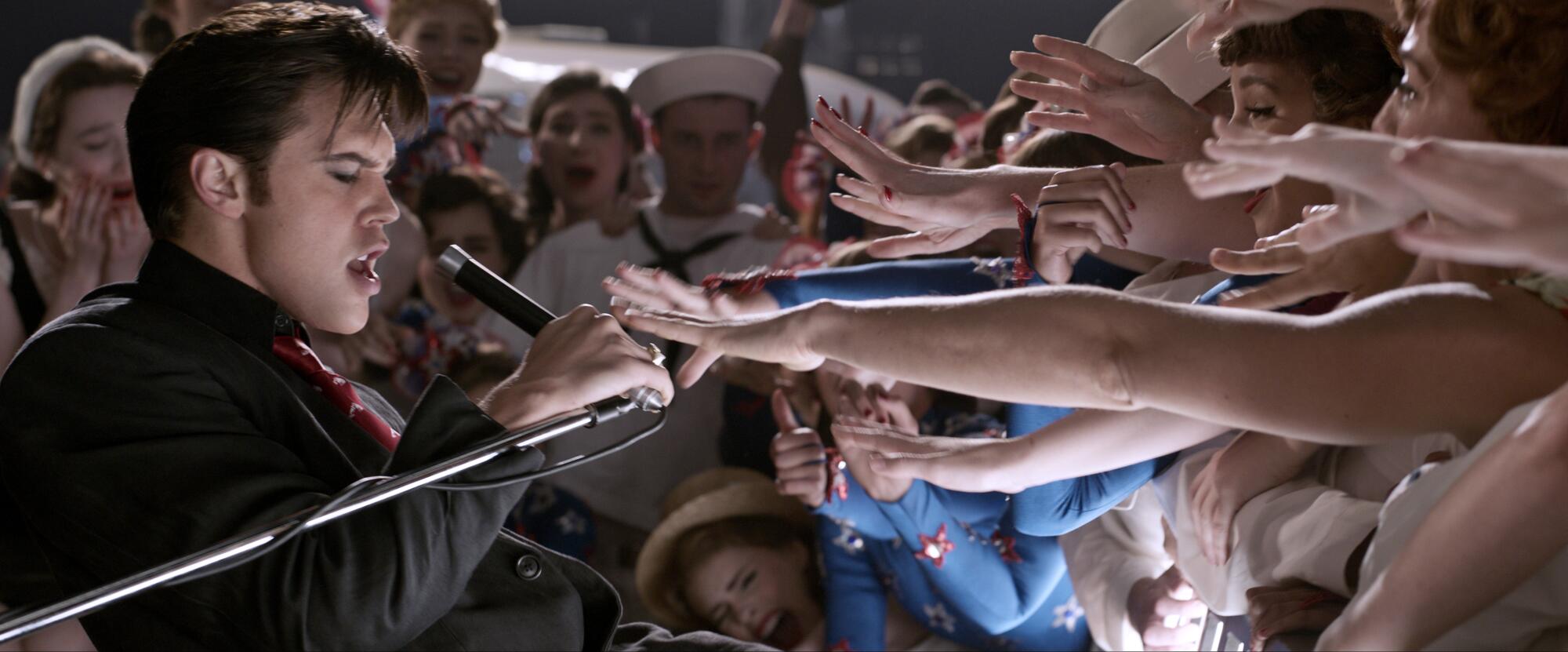
“I love the smell,” he says, smiling. “There’s a person who makes cologne and candles, and they bottled the scent of the Pirates of the Caribbean. I could smell that all day.”
What does the Pirates of the Caribbean smell like? “Sweet and musky,” Butler answers in a low, honeyed Southern drawl, an accent still ingrained in his speech some 20 months after finishing “Elvis.” He’s aware of it and laughs when I point it out. “They had to hire a dialect coach on the next thing I shot [‘Masters of the Air,’ a World War II limited series about the 8th Air Force] to make sure I didn’t sound like Elvis.”
In an alternate universe, we could be sitting here right now talking about Butler playing another fighter pilot — Rooster Bradshaw in “Top Gun: Maverick.” While he was performing in the 2018 revival of Eugene O’Neill’s “The Iceman Cometh” on Broadway, Butler’s agent called, telling him the “Top Gun” producers wanted him to go to Florida to screen test. Butler said no. Days earlier, he and Quentin Tarantino shook hands on a deal for Butler to play Manson “family” member Tex Watson in “Once Upon a Time in Hollywood.” It wasn’t a big part, but Butler had grown up revering Tarantino’s work, and he wasn’t going to pass on the dream of working with him.
So Butler made “Once Upon a Time in Hollywood,” finished filming in November 2018 and then found himself out of work again — and spiraling into sadness. Over his career, he had considered quitting acting many times but could never let go. While grinding through years of making teen sitcoms for the Disney Channel, Nickelodeon and the CW, he kept coming back to a quote from Ira Glass about how your taste gets you into art and then you need to keep working until your skill level catches up to your taste. Butler held onto that and would watch “Raging Bull” for the 100th time, take inspiration, hone his technique and hope for a chance.
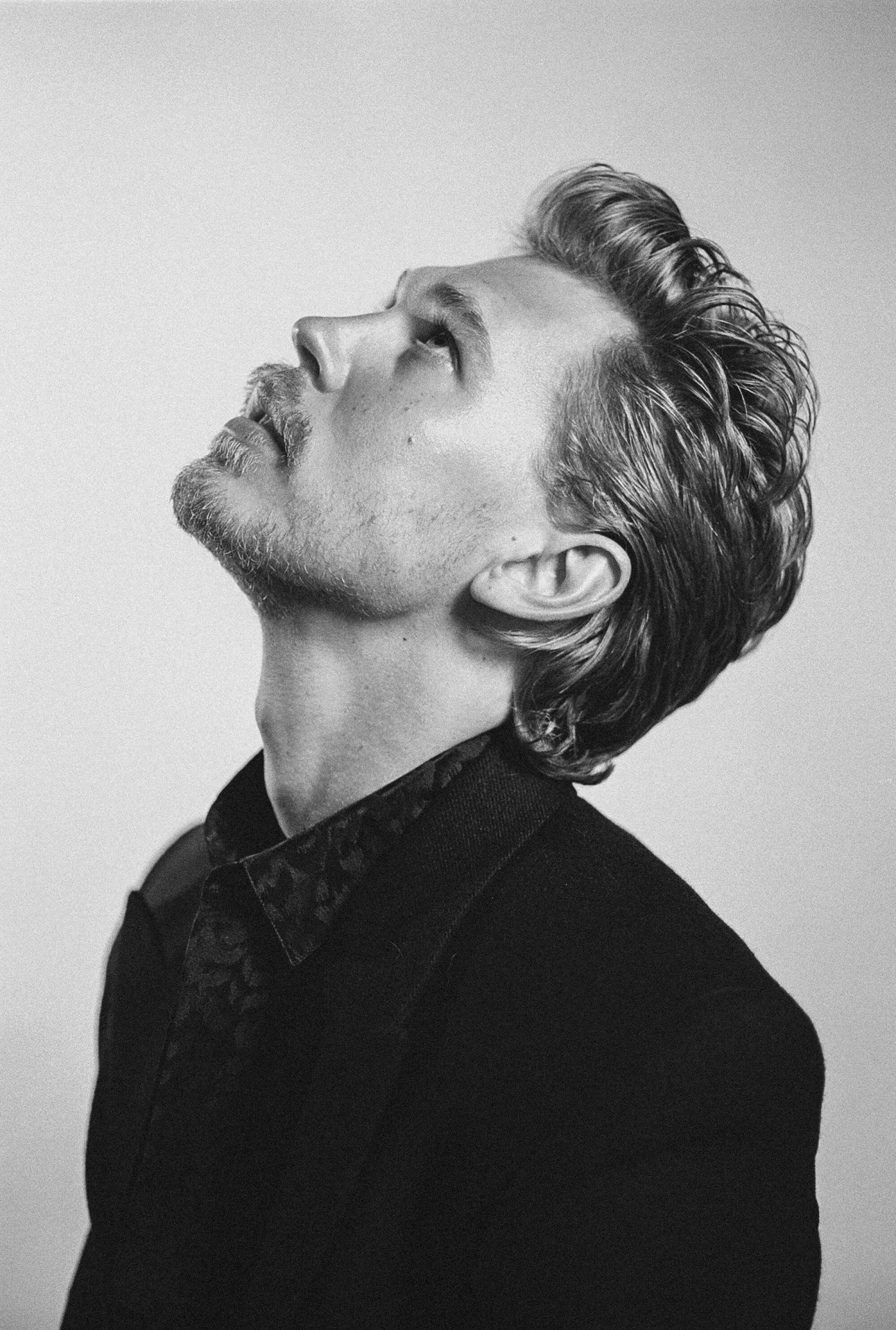
Acting opposite Denzel Washington in “The Iceman Cometh” (“you could see he was going to be a star,” Washington tells me) was the first step. “Once Upon a Time in Hollywood” — in which he tells Brad Pitt during the climactic showdown that he’s “as real as a doughnut,” a line that was originally “I’m as real as a bullet,” but Pitt misheard it in rehearsal and, just before saying action, Tarantino told Butler to sub in “doughnut” — was the second.
Our BuzzMeter film experts predict the Oscar winners in 10 categories. Check out the consensus picks, close races and interesting narratives - and vote in the polls for every category.
But after that, nothing came that convinced Butler that he’d be taking the next big step. He remembered something Pitt told him — “play the long game ... if it doesn’t ring out to your heart, don’t give it the time of day” — so he turned down everything for four months, even though it was “maddening,” even though he felt his mental health slipping. And then he heard Luhrmann was making “Elvis.” And that’s when he started making his Spotify lists, treating his extended audition as a job and, as he puts it, “deluding myself into thinking that if I just believe that this job is mine, then no one can stop me.”
The breakthrough moment came after he had filmed himself singing “Love Me Tender” to send to Luhrmann and came away feeling dispirited. It was an Elvis impersonation. Nothing more. At the time, Butler had been watching every Elvis performance he could find on video and YouTube, and he came across “Unchained Melody,” a song Elvis sang on his last tour, a year before he died. Elvis is out of breath and struggling, but mid-song, he nails a high note, and he looks out into the audience and smiles. Butler cries every time he sees that smile, the twinkle in Elvis’ eyes reminding him of the young singer who captured the hearts of the world.
One night Butler woke up from a nightmare — he dreamed his mom was dying again. Cancer had taken her when Butler was 23, the same age Elvis was when his beloved mother died.
“It was that thing where I knew this could just become a very bad day, you know, where you start out in deep grief,” Butler says, recalling that morning. “And I just thought there’s got to be a way to channel this feeling. And I was obsessing so much about Elvis that it became this other thing of going, ‘OK. He felt grief. How did he deal with it?’ Well, he would sing. He would pour out his soul into song.”
So still in his pajamas, Butler put on a bathrobe, sat down at a piano, turned on a camera and sang “Unchained Melody” to his mom.
A few weeks later, Luhrmann called with the offer.
“You know, I’m a shy guy, never sang, never danced, so even if I didn’t get the part, I was going to revel in the fact that I got to explore that part of myself for five months and experiment with Baz,” Butler says. He pauses, then breaks into a smile. “That said, I’m pretty happy I got the job.”
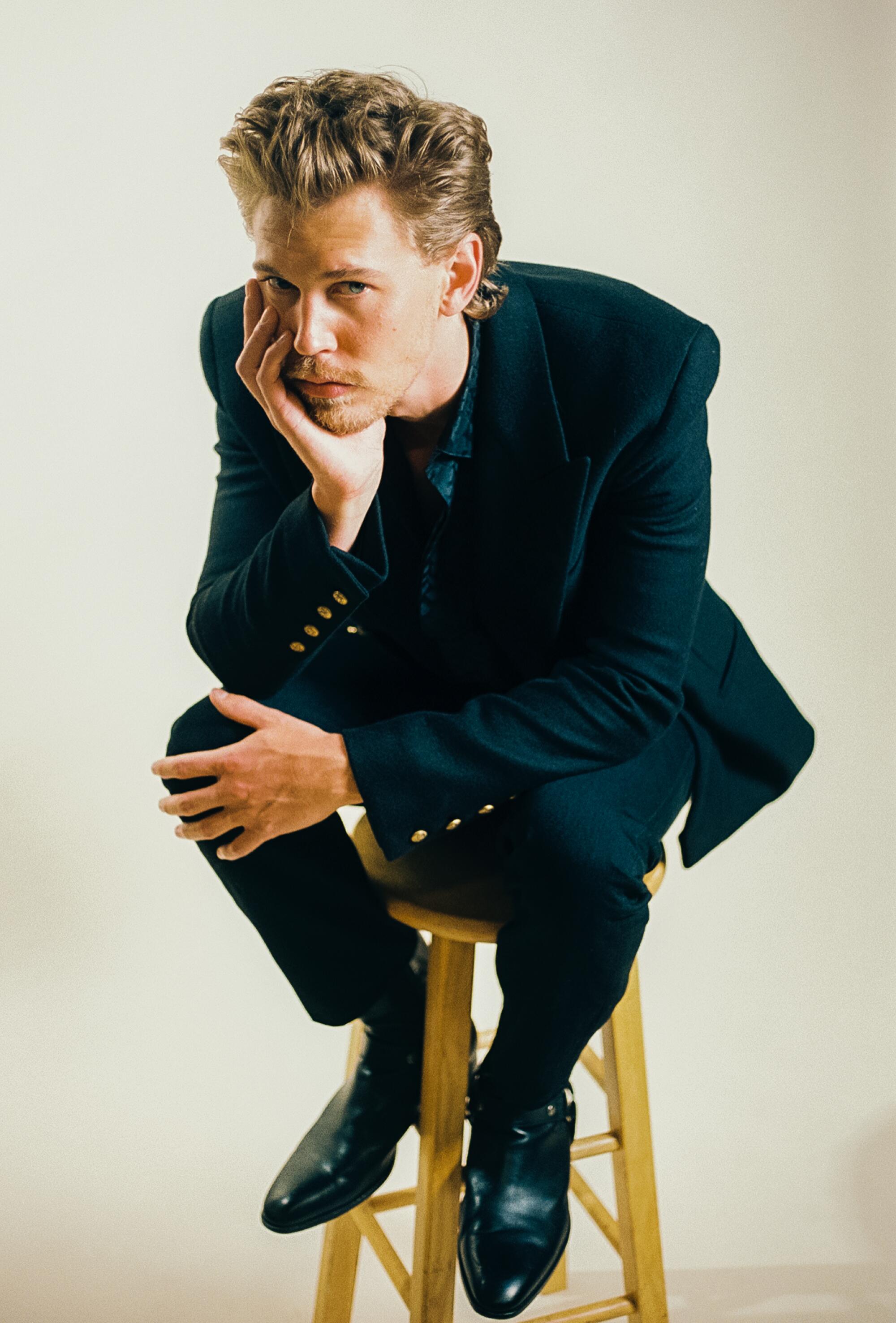
More to Read
From the Oscars to the Emmys.
Get the Envelope newsletter for exclusive awards season coverage, behind-the-scenes stories from the Envelope podcast and columnist Glenn Whipp’s must-read analysis.
You may occasionally receive promotional content from the Los Angeles Times.
